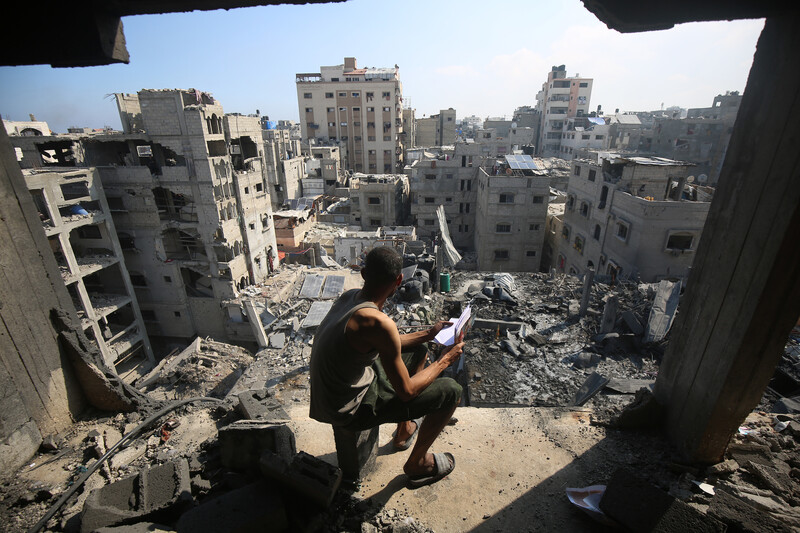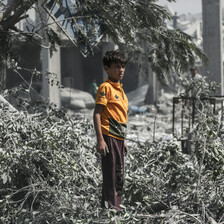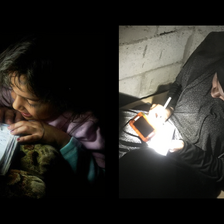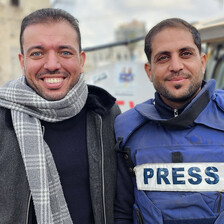The Electronic Intifada 10 July 2025

The site of a recent airstrike in Gaza City’s beach refugee camp, 4 July.
APA imagesOnly people who have lived through a genocide and felt it in their bones can truly understand what it means — the constant fear of death and loss, physical hunger and yearning to feel safe.
Reading news articles and watching videos of the aftermath of Israel’s massacres might provide for a basic understanding of the situation we are enduring here in Gaza.
But that is not the same as experiencing it with all five of your senses: the constant buzz of surveillance drones in the sky, the acrid smell of smoke from bombed buildings, the bitter taste of impure water that never truly quenches thirst, the grimy feel of dust and debris underfoot, and the sight of grey destruction and grief in every direction.
Nor is it the same as enduring the emotional toll: the panic of not knowing where your loved ones are, the weight of constant fear, the sorrow of unfathomable loss, and the exhaustion of carrying grief without rest.
Suffering in solidarity
While no one who hasn’t lived through this can truly understand it, there are small but powerful ways by which people outside Gaza can try to better imagine our reality.
A friend in the US recently told me that they did something different for a fundraising event for food relief in Gaza.
Volunteers prepared traditional Gazan dishes for the event using the limited ingredients that have been available during the genocide, such as tomatoes, garlic, beans and bread.
There was plenty of food at the fundraising event, in contrast to those same ingredients representing survival amid extreme scarcity here in Gaza. But it was a creative way to bring people a little closer to the reality we’re living through.
Other activists and people of conscience have gone several steps further by going without food in solidarity with people here in Gaza, where the fortunate have been surviving on one meal per day for months.
Jewish Voice for Peace activists in Chicago launched an indefinite hunger strike in mid-June, while Veterans for Peace recently concluded a 40-day hunger strike outside the US Mission to the United Nations.
Others have been undertaking day-long fasts or only eating 250 or 300 calories per day – mirroring the average intake in Gaza – to raise awareness of our situation and pressure their elected representatives.
More than symbolic gestures, people are putting their bodies on the line through these urgent moral responses aimed at piercing the political indifference and media silence to say with their own physical suffering: “We will not look away.”
These acts of solidarity – at a time when we in Gaza now resort to baking bread made with ground lentils or pasta in lieu of flour – move me deeply.
Fighting to survive
I want my young children, who were abroad when the war began, to know that their dad in Gaza City and everyone else in their wider family and community are fighting to survive every single day.
I recently suggested to my wife that she let our kids experience a day or two with just a limited amount of water to help them grasp what scarcity really means. This small act might allow them to imagine what children like them are enduring, and why it matters to speak out and act against injustice.
In Gaza, people are lucky if they get a few hours of water a week. We collect rainwater, dig wells and rely on unsafe sources like sea water. Children bathe using cups. Women wash dishes with buckets. Some people walk kilometers just to find a gallon of clean water for their families.
How can our friends around the world feel what this means? Perhaps by trying to live it. Maybe turn off the faucet for a day. Eat only what can be cooked with no electricity, or only what could be found in a war zone market at exorbitant prices such as chickpeas, lentils, salt and tomato sauce. Then imagine eating only this for months on end.
A call for closeness
This is not a call for guilt but a call for closeness by better connecting to our reality.
You can read the fact that thousands of children are starving. But by making a small effort to put yourself in the shoes of a parent in Gaza, you can imagine what it’s like to watch your own child have to go without meals and watch them lose weight and cry from hunger.
Feeling discomfort that is not your own is a powerful form of empathy and connection and a bridge to more meaningful forms of action and advocacy.
Imagining and embodying the experience of others — even if voluntarily and temporarily — strikes at the conscience. And from that consciousness comes a sense of responsibility to ask hard questions and commit oneself to doing the work to change the situation by building power through organizing.
Don’t just consume the genocide by watching videos on social media but live it — even briefly — and feel what it means to go without. Then act from that place. That is where real solidarity begins.
Asem Alnabih is an engineer and PhD researcher currently based in Gaza City. He serves as the spokesperson for Gaza Municipality and has written for many platforms in both Arabic and English.





